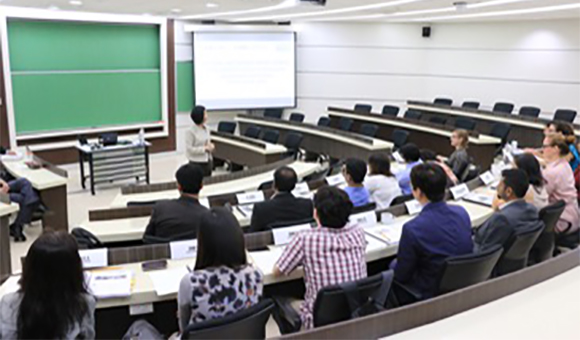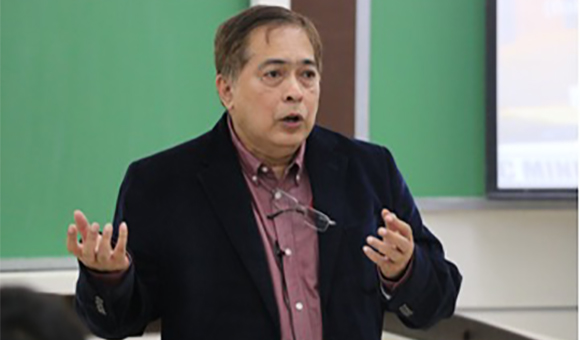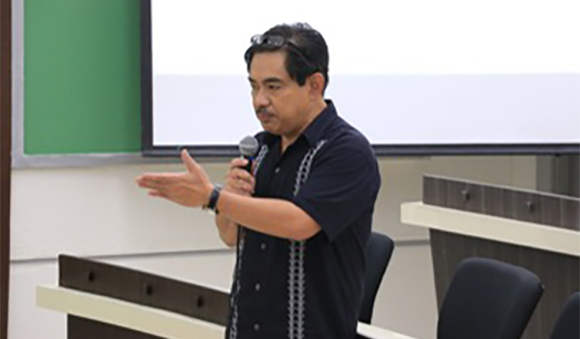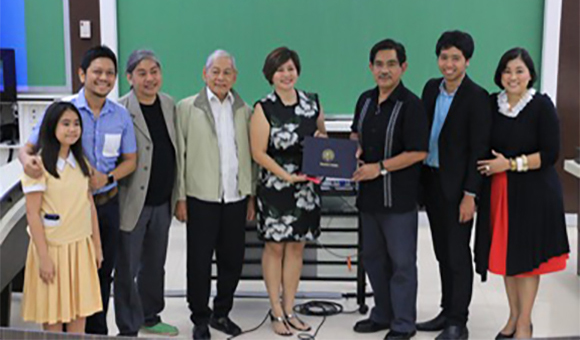Asian Institute of Management Philippines
On Day 1 of Global Network Week (GNW), 17 students from Indian Institute of Management - Bangalore, Seoul National University, Yale School of Management, and Yale School of Forestry were welcomed by Dr. Jikyeong Kang, president and dean of the Asian Institute of Management, Prof. Noel M. Cortez, head of the AIM-W. SyCip Graduate School of Business, and Prof. Fernando Y. Roxas, executive director of AIM-Dr. Andrew L . Tan Center for Tourism.
The session began with a testimonial from former GNW participant Nina Lagpacan from the Yale School of Management. She shared her thoughts from the Sustainable Tourism and Heritage Tourism course offered last March 2015. From the visit to the heritage town of Taal, she gained an understanding of how old houses are being preserved by families to create business by restore and convert them into museums. She also discussed having visited Anilao, which gave her the chance to meet sea turtle conservation expert and resort owner Romy Trono, from whom she learned abou the advocacy and business model he employs in managing his bed and breakfast resort. While in Anilao, Lagpacan enjoyed her first scuba diving experience and discovered coral bleaching resulting from climate change. Now on her second GNW, she and her classmates are all excited to learn and discover what Philippines has to offer in terms of sustainable agrotourism in the upcoming field visits.

Eylla Laire M. Gutierrez, database and research associate of the AIM-Dr. Andrew L. Tan Center for Tourism, gave the students a comprehensive introduction to Philippine tourism, including an overview of the efforts leading to the success of the memes, videos, and advertisements of “It’s More Fun in the Philippines” by the Department of Tourism and how tourists are encouraged to visit the Philippines again. It was said that tourism greatly affects the economy by involving multi-stakeholders and the local community by creating jobs.

Prof. Benjamin C. Bagadion, Jr., who spent his career as an envirornmental sociologist, talked on ecotourism and sustainable tourism development in the Philippines. In this classroom session, students were introduced to other protected areas in the Philippines (e.g. Apo Island, Pujada Bay). Students got to analyze the case study Managing the Pujada Bay Protected Landscape and Seascape. Analysis of the case study as discussed in the class boils down to three essential lessons: (1) The beauty of nature should be the starting point of designing programs; (2) There is a need to ensure community participation and ownership in order to avoid elite capture. That is, the community cooperating with local government will be at its optimum if there is a sense of ownership among community members. However, this requires political will; and (3) To enhance environmental protection, there is a need to anticipate second-generation problems. Hence, leadership is a critical variable because leadership can create a win-win situation.

After lunch break, Prof. Fernando Y. Roxas gave a lecture on sustainable tourism. In this session, it was established that ecotourism is a form of sustainable tourism—the triple bottom line strategy. The global ecotourism market has been one of the fastest growing sectors of the tourism industry, with an estimated annual growth range of 5 percent to 50 percent. Given this growth rate, ecotourism has the capacity to create eight billion visits per year to protected areas. The reasons for this global ecotourism growth are: environmental awareness and interest, media exposure to natural areas, satisfaction with traditional tourism, and increased connectivity to ecotourism destinations.

AIM alumna Ofelia Odilao-Bisnar discussed the business model of Nuvali Ecoliving in Laguna, which is a campus-style commercial district integrating modern facilities and sustainable practices with natural open landscapes. Because of its location and natural surroundings, it is becoming the most preferred location for real estate and business. She mentioned that the master plan and design encourage community interaction: open spaces and recreational areas accessible to all residents, employees, and transients of Nuvali to strike the live-work-relax-grow lifestyle balance.
The students were encouraged to ask questions on the challenges of private-public partnerships, the replication of Nuvali’s business model in other possible areas in the Philippines, and the costs and benefits of developing an eco-community in the country in the urban area.
For the last lecture, Agnes Gutierrez and Reimon Ocampo Gutierrez of Prado Farms discussed how their family-owned, five-hectare land was transformed into a bed and breakfast and garden business. After Reimon was diagnosed with cancer a few years back, he needed to shift to a healthy diet and lifestyle. So, the Gutierrez family turned the property into a bed and breakfast and a garden where guests could experience organic food and the joys of slow living, such as riding water buffalo and having a quiet time with no television and internet connection.
Situated in Lubao, Pampanga, the place used to be home of the Gutierrezes’ LPG refilling business. It was then transformed and rebuilt by the head of the family, architect Victor Gutierrez, and his late wife, jeweler Amada Ocampo. “We can’t keep on spending without any financial return. We need to sustain the education of our scholars and transform the property to be useful.” Reiman mentioned that operations are important to deliver business consistently.
Gutierrez said most of the trees were planted 30 years ago, and through biodiversity methods, electricity is kept at minimum. The property had rice fields that can provide a year of rice harvest for its visitors. Its vegetable garden does not use any chemicals and fertilizers. They advocate that healthy living is part of the experience. At present, Gutierrez mentioned that customers are those who want to do workshops on a farm setting and foreign-based Filipinos who saw the place through the social media. Clients stay an average of two days, mostly on weekends.
“We decided to run the business as a family in order to sustain it. We had set up a foundation independent from the business, but we maintain its ownership. In that manner, we can preserve the business for the next generation.’’
